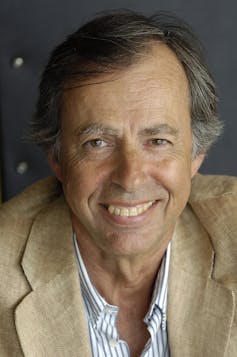My own introduction to the murders at Charlie Hebdo came via an email I received that morning from the Research Network on Innovation, which shares with me a deep interest in the economics of the entrepreneur. I had been invited to the first-ever conference on Jean-Baptiste Say and the Entrepreneur in July last year, held at the university in Boulogne-sur-Mer. This was the note, which came in both French and English, sent out by its director.
Dear colleagues,
I have been shocked to learn that our colleague Bernard Maris was murdered in the office of the journal “Charlie Hebdo”, Paris. From the beginnings of Innovations, Bernard (uncle Bernard) has been a major scientific support for our journal. He has been a member of the Scientific Committee, author and advisor of the Editorial Board of Innovations.
Best regards, Dimitri Uzunidis.
Bernard Maris is seldom named as among the 12 victims in English-language reports but he was well-known in France. This Wikipedia entry notes he had been an economist, writer, journalist and shareholder in Charlie Hebdo magazine since 1992, before adding:
He was murdered on 7 January 2015, during the Charlie Hebdo shooting at the headquarters of the magazine in Paris.

Whether I had met Maris I do not recall, as there was a very large number of economists at the conference. Everything I am about to say about Maris will therefore be stitched together from other sources, since my only association is via his work on innovation and entrepreneurship which is only a small part of what he did. But the one-word description that does come out in what I have read is “iconoclast”. That he was so closely associated with Charlie Hebdo makes that very clear. And brave as well, as undoubtedly he understood the risks, as did each of the others.
According to an AFP report, he was a recognised researcher, familiar for his appearances on radio, television and in the press, as well as writing a weekly satirical weekly column signed “Uncle Bernard”.
And what illustrated his talents as a difficult-to-categorise populariser was his frequent description as a “journalist-economist”.
He had written numerous books with evocative titles including, in 1998, Ah that economic Lovely War!, and in 2010, Marx, Marx oh, why have you forsaken me? But it was his Anti-saving manual, released in early 2000, in which the first volume is devoted to the ants and the second to the grasshoppers, that was his most successful publication.
He was a member of the scientific board of Attac, and the Green candidate in the 2002 legislative election. In 2011, the President of the Senate, Jean-Pierre Bel, was surprised that Maris had been asked to join the General Council of the Banque de France.
Another side to Maris has been provided this morning by his fellow Frenchman, Alain Alcouffe, on the Societies for the History of Economics online discussion forum.
He was a well-known figure in the world of economics and especially among historians of economics as he has devoted several essays to Keynes and economic methodology. His wit and irony were directed against any bigotry and pedantry and contemporary economists were not spared.
Among his last books one was coauthored with Gilles Dostaler, Capitalisme et pulsion de mort : Freud et Keynes Capitalism and death drive. As far as I know, few of his publications have been translated into English (if any).
There is no doubting that our economic visions were vastly different. Maris was a great admirer of John Maynard Keynes, to whom he dedicated a book, Keynes ou l'économiste citoyen. But the soul of our societies is that we are able to discuss our own views with each other in a spirit of goodwill, and with the aim of finding the truth, as best we can find it.
At the conference I attended in July, I was amongst roomful of individuals, like Maris, who are on the opposite side on matters I hold very dear. But the conference was one of the most enjoyable I have ever been to, filled with interesting people saying interesting things, and a paper of my own has been solicited and will be published later this year.
I will finish with something written by Maris that was translated into English by Alain Alcouffe as a tribute to Maris’s memory. It is from the last pages of Maris’ 1999 book, Lettre ouverte aux gourous de l'économie qui nous prennent pour des imbéciles (Open letter to the gurus of economics who take us for idiots).
And for that title alone, I feel even more deeply the loss to the world of this brave man, who stood by the values of the enlightenment against a darkness that threatens us all.
What are economists for?
If economics is the science of the market, they are useless – we have known it for a long time (since Keynes), and we get confirmation now from the most ultra orthodox (Debreu).
If the economy is a science that predicts the future, then the greatest economist is Madame Soleil [a famous French astrologer].
If economics is the science which deals only with “trust”, then the greatest economist is Freud. If economics is the science which deals only with “transparency”, then the greatest economists are accountants, policemen, customs officers or judges.
If economics is a religion, then Camdessus is the high priest of it, but the best economist will remain Pope John Paul II.
If economics is only gossip and chatter, many journalists can aspire to be awarded the Golden Palm.
Every activity has a social utility. Even parasites are useful: they allow us to highlight the so-called “useful” people. Just as there is nothing “harmful” in ecology – except in empty heads of hunters – it is rare to be unable to associate a utility to a part of the social body. The parable of Saint-Simon, which showed that the wealth of France would not decrease if we removed many lazy people, writers and others, is questionable, and the same holds for the uselessness of the ancient Greek and music taught at university. So … what are the casuists of utilitarianism for?
Unquestionably the “experts”, the merchants of economic tales have a function of exorcism of the future. In a world without religion, they have the same function as gurus and cult leaders – and many of them combine the two businesses. They also play the role of bards, shamans or witch doctors of Indian tribes who talk incessantly to prevent the sky from falling on the heads. They are the inexhaustible storytellers of irrational, credulous, illiterate and but not uncultured societies that are no doubt more cheerful than ours.
But what have the children of Smith, Marx and Keynes to do? Are they condemned to play the roles of sorcerer, high priest or guru?
Obviously not. They can denounce the merchants of confusion, promote economics as a science of man, and not as a hard science, they can question history, civilisations, they can think about value and wealth. They can denounce efficiency and productivity – or simply leave it to business managers, they are paid for it! – And they can return to psychology, sociology, history, philosophy. Thinking about labour, time, money. In short, they can go back to Smith, Keynes and Marx.
They can also go for soup and sell their beautiful science for the lentils of expertise, and be content with the role of the fool whose legs are pulled twice a year when growth projections are presented, and every day when the Russian mafia recycles dollars which have been loaned to it in false candour.
But then, they should not speak of “quality assessment” or “technical correction”.
Let them put a pointed cap, a red nose, let them wag with their ears and tickle the armpits.
What were economists for, one will ask a hundred years from now? To make people laugh.
Bernard Maris, 1999
(Translated from French by Alain Alcouffe)

